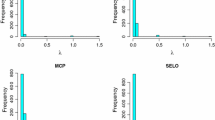Abstract
In this paper, we study the robust estimation for the generalized autoregressive conditional heteroscedastic (GARCH) models with Gaussian errors. As a robust estimator, we consider a minimum density power divergence estimator (MDPDE) proposed by Basu et al. (Biometrika 85:549–559, 1998). It is shown that the MDPDE is strongly consistent and asymptotically normal. Our simulation study demonstrates that the MDPDE has robust properties in contrast to the maximum likelihood estimator. A real data analysis is performed for illustration.
Similar content being viewed by others
References
Baillie RT, Bollerslev T (1989) The message in daily exchange rates: a conditional variance tale. J Bus Econ Stat 7:297–305
Basu S, Lindsay BG (1994) Minimum disparity estimation for continuous models: efficiency, distributions and robustness. Ann Inst Stat Math 48:683–705
Basu A, Harris IR, Hjort NL, Jones MC (1998) Robust and efficient estimation by minimizing a density power divergence. Biometrika 85:549–559
Beran R (1977) Minimum Hellinger distance estimates for parametric models. Ann Stat 5:445–463
Berkes I, Horváth L, Kokoszaka PS (2003) GARCH processes: structure and estimation. Bernoulli 9:201–227
Billingsley P (1961) The Lindberg-Levy theorem for martingales. Proc Am Math Soc 12:788–792
Bollerslev T (1986) Generalized autoregressive conditional heteroskedasticity. J Econom 31:307–327
Bollerslev T, Engle RF (1986) Modeling the persistence of conditional variances. Econom Rev 5:1–50
Bougerol P, Picard N (1992a) Strictly stationary of generalized autoregressive processes. Ann Probab 20:1714–1730
Bougerol P, Picard N (1992b) Stationarity of GARCH processes and of some nonnegative time series. J Econom 52:115–127
Cao R, Cuevas A, Fraiman R (1995) Minimum distance density-based estimation. Comput Stat Data Anal 20:611–631
Engle RF (1982) Autoregressive conditional heteroskedasticity with estimates of the variance of United Kingdom inflation. Econometrica 50:987–1008
Francq C, Zakoïan J-M (2004) Maximum likelihood estimation of pure GARCH and ARMA-GARCH processes. Bernoulli 10(4):605–637
Franses PH, Ghijsels H (1999) Additive outliers, GARCH and forecasting volatility. Int J Forecast 15:1–9
Gouriéroux C (1997) ARCH model and financial application. Springer, New York
Hampel FR, Ronchetti EM, Rousseuw PJ, Stahel WA (1986) Robust statistics: the approach based on influence functions. Wiley, New York
Hsieh D (1989a) Modeling heteroskedasticity in daily foreign-exchange rates. J Bus Econom Stat 7:307–317
Hsieh D (1989b) Testing nonlinear dependence in daily foreign exchange rates. J Bus 62:339–368
Simpson DG (1987) Minimum Hellinger distance estimation for the analysis of count data. J Am Stat Assoc 82:802–807
Lee S, Na O (2005) Test for parameter change based on the estimator minimizing density-based divergence measures. Ann Inst Stat Math 57:553–573
Pardo L (2006) Statistical inference based on divergence measures. Chapman & Hall/CRC, London/Boca Raton
Park B (2002) An outlier robust GARCH model and forecasting volatility of exchange rate returns. J Forecast 21(5):381–393
Storti G (2006) Minimum distance estimation of GARCH(1,1) models. Comput Stat Data Anal 51(3):1803–1821
Tamura RN, Boos DD (1986) Minimum Hellinger distance estimation for multivariate location and covariance. J Am Stat Assoc 81:223–239
Vajda I (1986) Efficiency and robustness control via distorted maximum likelihood estimation. Kybernetika 20(1):47–67
Vyazilov AE (2001) Empirical processes in the GARCH(1,1) model and robust estimation of paramters. Russ Math Surv 56(5):990–991
Author information
Authors and Affiliations
Corresponding author
Additional information
We thank the editors, an associate editor, and three anonymous referees for their valuable comments.
Rights and permissions
About this article
Cite this article
Lee, S., Song, J. Minimum density power divergence estimator for GARCH models. TEST 18, 316–341 (2009). https://doi.org/10.1007/s11749-008-0093-y
Received:
Accepted:
Published:
Issue Date:
DOI: https://doi.org/10.1007/s11749-008-0093-y



